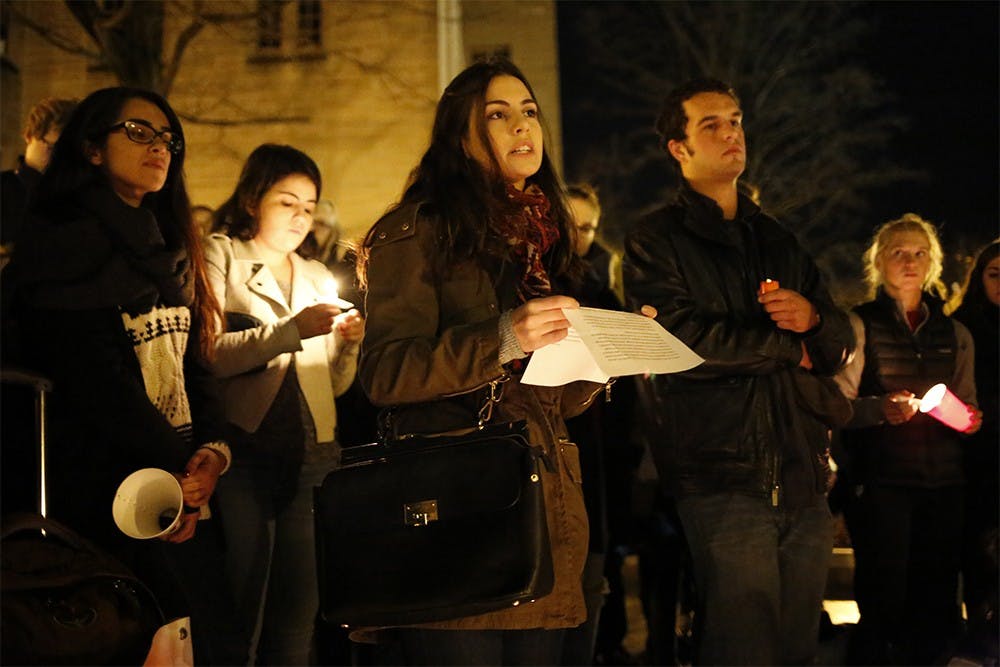“I’m a Muslim. No one will sit next to me in class. I’m not a terrorist, guys.”
Discrimination against Muslims has escalated since the attacks in Paris last Friday, and many in the Muslim community say they fear the waves of Islamophobia that follow incidents of terrorism, IU junior Dana Khabbaz said.
Khabbaz said she worries about the repercussions of the latest ISIS atrocity and how it is being interpreted by some.
“I’m pretty scared for my family and friends” Khabbaz said. “I’ve heard about minor acts of terror toward Muslims — attacks on Muslim homes and threats on mosques.”
Khabbaz said her sister, who is only 11, has received major backlash from her classmates.
“Other kids are saying things to her like, ‘We should bomb all the Syrians,’” Khabbaz said. “It’s so sad to hear things like that coming from kids. They have no filters, and they take awful things they hear at home and say them out in public.”
After a tragedy, people scramble for explanations and somewhere to place blame. Rather than blaming the individuals responsible, some condemn an entire religion, said IU professor Nazif Shahrani, who teaches a course about the War on Terror.
“Islam has become associated with terrorism because the people committing these atrocities suggest they are doing so for religious reasons,” Shahrani said. “These people are not Muslims. They are criminals, and they are motivated by politics.”
Khabbaz said she is glad not everyone is lumping terrorists and Muslims together.
“They’re taking something we hold so dear and doing something horrible to it,” Khabbaz said. “I actually expected a worse backlash, but I’ve seen a lot of people speaking up about the fact that we cannot define an entire religion by this.”
Still, many people, including public figures, think Islam breeds these violent acts. Following the attacks in Paris, political commentator Ann Coulter tweeted “Don’t want terrorism in the U.S.? Stop importing Muslims!”
A lack of exposure to Muslims and their culture causes misinformation, said Fariha Hossain, president of IU Muslim Student Association.
“People tend to define their views by those they are surrounded by,” Hossain said. “Without a personal contact with someone who is Muslim, they define their understanding by other things, like what they see in the media, which is negative nine times out of 10.”
It’s lack of understanding and empathy that led to many U.S. governors, including Indiana’s Mike Pence, to declare they will no longer accept Syrian refugees in their states, Khabbaz said.
This reaction came after a Syrian passport was found with one of the supposed attackers, However, all confirmed Paris attackers were of French origin, according to the New York Times.
“We have to remember the reason these people are refugees,” Khabbaz said of Syrians seeking relocation. “Killings like the ones in Paris aren’t even news in Syria. They’re fleeing the same thing that governors are allegedly trying to protect people from by denying refugees entry.”
Political posturing, such as banning Syrian refugees, does nothing to solve greater problems, Shahrani said.
“This scapegoating that politicians are doing is a tragedy,” Shahrani said. “They’re using religion as a way of avoiding policies and practices that have gone on far too long without any critical examination.”
Shahrani said many outlets fail to acknowledge that ISIS has killed large numbers of Muslims — more than 10,000, according to statistics from the United Nations and death tolls from the suicide bombings in Beirut and other mass killings this year.
It will take a major change of mindset to address the problems of terrorism and what they mean in the modern world, Shahrani said.
“The causes are never discussed, just the consequences and often horrible tragedies,” Shahrani said. “We get very excited and then try to blame and overgeneralize, but I don’t think blaming it on religion and Islam is going to fix anything.”
Hossain said she takes pride in her religion and hopes her confidence will show those around her that there is no reason to fear Muslims.
“Sometimes it feels like a race between Muslims and people who are becoming more and more fearful of Islamic people and culture,” Hossain said. “If you portray yourself with a level of confidence and let your personality show through, people are more understanding.”






